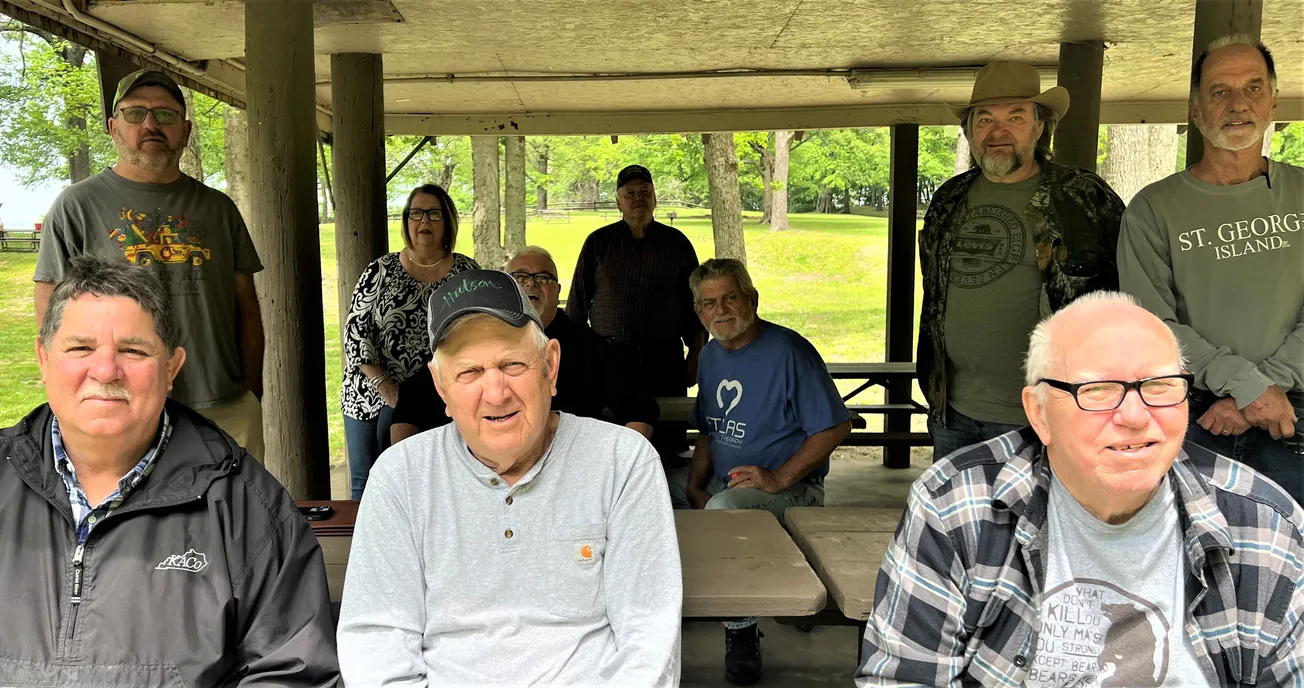Part of Kenny Fogle’s job is helping resurrect dormant Democratic county committees, almost all of them in Republican Red counties.
“My opening statement in almost every county I go to is, ‘We’ve lost some people, but we kept the best ones,’” said Fogle, the state party’s deputy political director.
Eleven of Carlisle County’s “best ones” showed up Saturday to try to revive the local committee.
County Judge-Executive Greg Terry was happy with the turnout. “I expected six of us and was afraid we might be the only six there,” he said.
The group reelected Terry committee chair and made plans to meet the first Saturday of every month in Bardwell, the county seat. “We had a great start, and I think it will grow even more,” he said. “But if it doesn’t grow for the next meeting, we don’t need to get down about it. We’re going to have to keep our foot on the pedal.”
Few Kentucky counties are redder than Carlisle. Hard by the Mississippi River, it’s in the Jackson Purchase, Kentucky’s westernmost region.
For years, the Purchase — that octet of trans-Tennessee River counties — was the state’s “Democratic Gibraltar.” The handle fit.
The region voted solidly Democratic in just about every election. But a seismic shift in political sentiment turned the Purchase — like most of Kentucky — toward the GOP. Gibraltar crumbled.
Bill Clinton was the last Democrat to win the region and the state in a presidential election. That was 1996. Donald Trump swept the Purchase and the rest of Kentucky in blowouts both times he ran.
Republicans represent Ballard, Calloway, Carlisle, Fulton, Hickman, Graves, Marshall and McCracken counties in Frankfort and Washington. Last year, for the first time ever, no Democrat filed to run for the state House or Senate.
Republicans also hold a slew of county offices. Terry is one of only two Democratic judge-executives in the Purchase.
Terry admits it will take time — lots of time — to rebuild the party in his county and regionwide. Like many Democratic officials, he’s counting on a big boost from young people.
The Carlisle party’s rebound started with a local Democratic Party Facebook page, the idea of Greg Weatherford, a union retiree.
It’s grown to include 43 followers, though not all of them are county residents.
News of the county party meeting was greeted with plentiful plaudits statewide and even from Tennessee: “Congratulations!” “Kudos to all of you, and Judge Terry for leading the way!” “Proud of you folx!” “wonderful ty/ly!!” “Fabulous!” “Awesome!” “Glad to see you are getting together in the rural areas.”
Fogle said the key to firing up Democrats in Red counties “is to let them know they’re not alone. There may be fewer of us, but now people are Democrats because they choose to be Democrats.”
Fifty-odd years ago, nine of 10 Purchase voters were signed up as Democrats. There were no Republican primaries and, often as not, no Republican candidates for local offices or the state legislature.
Consequently, many Republicans registered as Democrats just so they could vote in the primary and have some influence in the electoral process.
“But you could tell who a real Democrat was,” said the late state Rep. Dick Castleman of Mayfield. “They’d say ‘I’m a Democrat.’ A Republican would say ‘I’m a registered Democrat.’”
With growing Republican power came GOP primaries. More voters began registering as Republicans, too.
Historically, straight ticket Democratic voting prevailed in the Purchase on election day. Now, many, if not most, voters cast straight Republican ballots, also a statewide trend, especially in conservative, rural counties like Carlisle.
“In the past, Democrats were Democrats because they were born into that or that’s what their local community mostly was,” Fogle said. “But now if you’re a Democrat — and proud to be a Democrat — you are a Democrat because you choose to be and you know what it means to be a Democrat.”
“We need to let people know we’re proud to be Democrats and why,” said Terry.
The Carlisle countians met at Columbus-Belmont State Park in adjacent Hickman County, site of a Civil War Mississippi River strongpoint.
During the meeting, somebody pointed out that a Democratic president’s program helped get the park built during the Great Depression of the 1930s. Work crews included men from the Civilian Conservation Corps, part of Franklin D. Roosevelt’s New Deal, which was aimed at putting the country back to work.
State Democratic Party rules require committees to have at least 10 members, equally divided between men and women. Only two women attended the meeting, but other women have expressed interest, Terry said.
“When people call me and want to know about the rules, I say here’s the first rule: give me people,” Fogle added. “After that, we’ll worry about the rest.”
--30--
Comments








